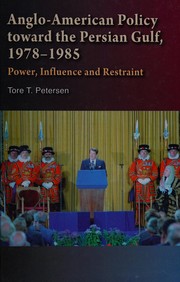Check nearby libraries
Buy this book

"For many commentators and historians the announcement of the Carter Doctrine signaled the end of the British presence and the final transfer of power to the United States in the Persian Gulf. But on the ground the reality was different. After the announcement of the British leaving the Persian Gulf in 1971, formal positions were replaced by informal ones. Britain still ran much of the political, economic, and military life in the lower Gulf and in the Arabian Peninsula. The transition from formal to informal empire was seamless: British influence remained large and almost paramount in the region. Margaret Thatcher's premiership saw a sharp increase in British influence not only in the traditional British enclaves of the Persian Gulf sheikdoms, but surprisingly even in Saudi Arabia. The historic Al-Yamamah deal with Saudi Arabia in 1985, selling advanced fighter aircraft, was Britain's largest ever arms deal. While British influence in the Gulf increased, the Americans floundered, culminating in the ignominy of the Iran/Contra scandal and the Reagan administration meekly accepting Iraqi dictator Saddam Hussein's apology for attacking the USS Stark and killing 34 American sailors in May 1987--payback for the Irani-American rapprochement. Tore T. Petersen sets out the policy objectives of Great Britain and the United States as they confronted the initial emergence of fundamentalist Islam, with the occupation of the Holy Mosque in Mecca and Khomenei's revolution in Iran. Research by the author in the Nixon, Carter, and Reagan presidential libraries provides strong evidence for U.S. strategy based on Nixonian foreign policy objectives, supported all the way through to the Reagan administration"--
"Tore Petersen provides an analysis on how Great Britain and the United States confronted the initial emergence of fundamentalist Islam with the occupation of the Holy Mosque in Mecca and Khomenei's revolution in Iran. Despite the loss of Iran, the United States and Britain managed to secure the Arab side of the Persian Gulf in the Western camp"--
Check nearby libraries
Buy this book

Previews available in: English
Subjects
Islam and politics, International Relations, Government, General, POLITICAL SCIENCE, International, Diplomatic relations, Außenpolitik, Foreign relations, History, POLITICAL SCIENCE / International Relations / General, POLITICAL SCIENCE / Government / International, Great britain, foreign relations, persian gulf region, United states, foreign relations, persian gulf region, International relations, Military HistoryPlaces
United States, Großbritannien, Golfstaaten, Middle East, USA, Great Britain, Persian Gulf RegionTimes
20th century, 1981-1989, 1977-1981Showing 1 featured edition. View all 1 editions?
| Edition | Availability |
|---|---|
|
1
Anglo-American policy toward the Persian Gulf, 1978-1985: power, influence and restraint
2015, Sussex Academic Press
in English
1782841849 9781782841845
|
aaaa
Libraries near you:
WorldCat
|
Book Details
Published in
Brighton
Table of Contents
Edition Notes
Includes bibliographical references (pages 128-163) and index.
Classifications
The Physical Object
ID Numbers
Community Reviews (0)
Feedback?| December 21, 2022 | Edited by MARC Bot | import existing book |
| October 4, 2021 | Edited by ImportBot | import existing book |
| November 13, 2020 | Edited by MARC Bot | import existing book |
| July 18, 2020 | Created by ImportBot | import new book |









